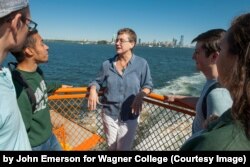College teachers are finding new ways to help students find jobs in occupations where there are few openings.
Some help their students reach out to people who can help them find hard-to-get jobs. This person-to-person method is known as “networking.”
They are also offering classes that can help students learn skills outside their chosen professions. It will help them find jobs if jobs are not available in their first choices for work.
Helping to create tomorrow’s playwrights
Paula Vogel teaches theater students at Brown University in Rhode Island. Vogel is a prize-winning playwright. She received a Pulitzer Prize for excellence in writing.
There are many more plays written than get produced. Vogel supports her students by helping them connect to a group of people who can help them reach their dreams.
That includes literary agents who represent playwrights her students respect. And that also includes people working in theater productions with Brown University connections. Vogel employed two former Brown students in her show, “Indecent,." It closed on August 6 after 143 performances on New York's Broadway.
Vogel is also big on helping talented students believe in themselves.
Steven Levenson had two shows performed in New York this year. One is the hit Broadway musical, “Dear Evan Hansen.”
Levenson is a former student of Vogel's. He remembers how she took him and other students out for coffee.
“She said if this is something that you want to do -- this writing thing -- I believe that you can do it.”
“That kept me going for several years, just that one conversation -- you know through sort of the darker moments of being in New York and trying to figure it all out. So, I give her all the credit for that.”
Journalism jobs decline
Lorraine Branham heads the S.I. Newhouse School of Public Communications at Syracuse University in New York. It prepares students to work in the news media, which has been cutting jobs in recent years.
Branham said the Newhouse school is offering more classes on how students can present news through the Internet. Students are also learning how to produce videos and get their stories out on social media.
It is a difficult job market, but Branham noted, “Our students are finding jobs after graduation.” She said some wish they could get more time to do longer stories and explain important issues.
But Branham said she sees reason for hope. Two major newspapers -- The New York Times and The Washington Post -- are both gaining readership, partly because of stories about the Trump administration, Branham said.
“I like to joke about the president making journalism great again,” she added.
‘Jokes’ about English majors
For years, there have been jokes about English majors graduating from college with great knowledge of Shakespeare’s plays, but no job offers.
Michael Kuczynski heads the English department at Tulane University in New Orleans, Louisiana. He said the school’s English majors are finding work, although not always directly connected to their studies.
He said businesses are employing English majors because of their ability to communicate clearly. So are public relations companies and non-profit groups.
Kuczynski said English majors also continue to teach at both the college and high school levels.
For many students, it was a high school English teacher who helped them write creatively and begin to understand great literature.
“Teaching for me is brand new every day and it’s so exciting to watch kids becoming passionate and committed to the kind of things that you find important.”
It’s not easy to star in a movie or play
Acting is another difficult occupation.
It is not uncommon for 300 people or more to “try out” for New York theater productions, with fewer than 20 being chosen. Some actors work in Los Angeles for most of their adult lives without ever getting more than a small part in a major movie or television show.
J. Ed Araiza works at the University of California, Los Angeles (UCLA). He is head of graduate acting at the UCLA School of Theater, Film and Television. Felicia Ruff is a professor and chair of the Department of Theatre and Speech at Wagner College in New York.
Both she and Araiza said there is some luck needed to succeed as an actor. But more often, they agree, it is all about hard work and good training.
“Dreaming big is important, Ruff said. “But hard work, resilience, stick-to-itiveness are all extremely important.”
Araiza agrees. He said many UCLA acting graduates have gone on to successful careers in movies, theater and television.
But others have found success doing something they probably did not expect when they started at UCLA. For example, some are earning a good living reading books for audio recordings, Araiza said. Others are teaching new theater students.
UCLA’s acting program tries to prepare students for a number of occupations -- so they can get jobs even if they do not get parts in popular movies, Araiza said.
He and Ruff said that people put too much importance on making a lot of money or becoming famous.
Araiza said he tells students seeking to attend UCLA’s acting program that “nothing is guaranteed in art” and that succeeding is difficult.
Ruff tells them that they will face rejection -- even at school as they try to get parts in college shows.
She said, “But that is only telling someone that one door isn't opening for them -- that doesn't mean there aren't other doors for them to walk through."
I'm Alice Bryant.
And I'm Bruce Alpert
Bruce Alpert reported on this story for VOA Learning English. George Grow was the editor.
We want to hear from you. Write to us in the Comments Section and share your views on our Facebook Page. What is your dream job? And how do you think you can get it?
________________________________________________________________
Words in This Story
playwright - n. a person who writes plays
talented - adj. having a special ability to do something well
conversation - n. an informal talk involving two people or a small group of people
moment - n. a short period of time
brand new - adj. fresh, like it just happened
passionate - adj. full of emotion and feelings
commit - v. to say that someone will definitely do something
resilience - n. the ability to become strong, healthy, or successful again after something bad happens
stick-to-itiveness -- n. strong determination to keep doing something even when it is difficult
graduation – n. the act of completing a study program at a school, college or university









